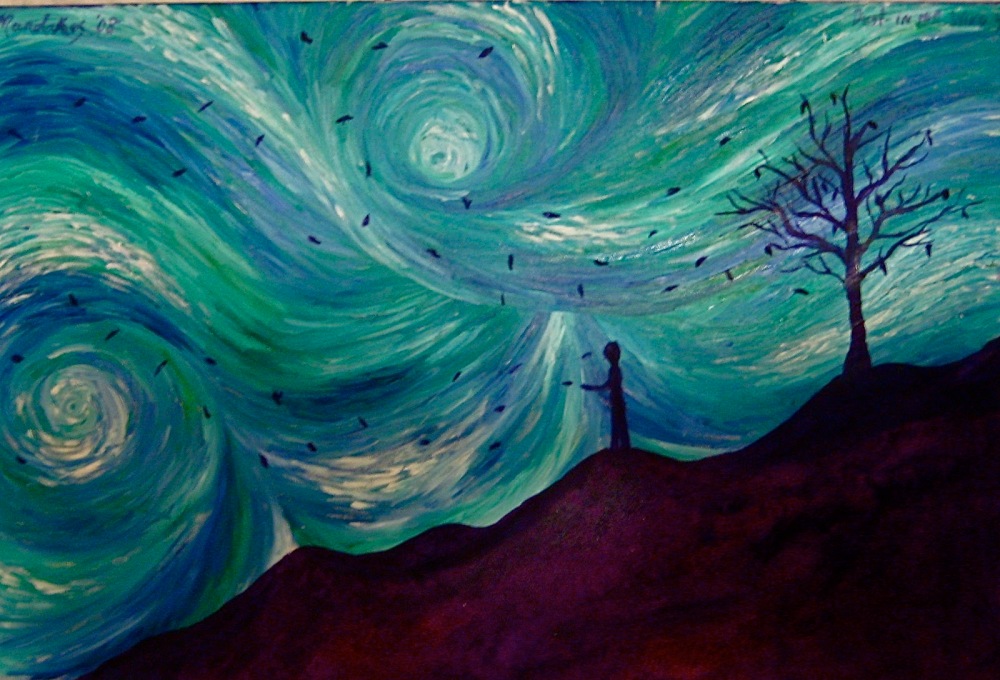“The Wind of God”
Rev. Jeremy Watson
St. Andrew’s Presbyterian Church February 28, 2016
Genesis 1:1-5
In the beginning when God created the heavens and the earth, 2the earth was a formless void and darkness covered the face of the deep, while a wind from God swept over the face of the waters.
3Then God said, “Let there be light”; and there was light. 4And God saw that the light was good; and God separated the light from the darkness.5God called the light Day, and the darkness he called Night. And there was evening and there was morning, the first day.
Acts 2:1-13
When the day of Pentecost had come, they were all together in one place. 2And suddenly from heaven there came a sound like the rush of a violent wind, and it filled the entire house where they were sitting.3Divided tongues, as of fire, appeared among them, and a tongue rested on each of them. 4All of them were filled with the Holy Spirit and began to speak in other languages, as the Spirit gave them ability.
5Now there were devout Jews from every nation under heaven living in Jerusalem. 6And at this sound the crowd gathered and was bewildered, because each one heard them speaking in the native language of each.7Amazed and astonished, they asked, “Are not all these who are speaking Galileans? 8And how is it that we hear, each of us, in our own native language? 9Parthians, Medes, Elamites, and residents of Mesopotamia, Judea and Cappadocia, Pontus and Asia, 10Phrygia and Pamphylia, Egypt and the parts of Libya belonging to Cyrene, and visitors from Rome, both Jews and proselytes, 11Cretans and Arabs—in our own languages we hear them speaking about God’s deeds of power.” 12All were amazed and perplexed, saying to one another, “What does this mean?” 13But others sneered and said, “They are filled with new wine.”

There was a minister who once decided to use a very clever visual demonstration to add emphasis to his sermon. He placed 4 worms in 4 separate jars. In the first jar the worm was swimming in alcohol. In the second jar the worm was engulfed in cigarette smoke. In the third jar, the worm was swimming in chocolate syrup. And in the fourth jar, the worm was in good, clean soil. At the conclusion of the sermon, the pastor reported that the first worm, in alcohol, was dead. The second worm, in cigarette smoke, was dead. The third worm, in chocolate syrup, was dead. But the 4th worm, in good clean soil, was alive! So he asked the congregation what they had learned from this demonstration. Maxine was sitting in the back, and quickly raised her hand and said, “If you drink, smoke, and eat chocolate, you won’t have worms!” That pretty much ended the worship service.
Let’s hope that today’s sermon is a bit more effective than that. But keep the soil in mind, if you can.
In Job, chapter 38 through chapter 40, we have God’s longest speech in the Bible. It is an answer to Job, who had questioned God after a series of tragedies that had struck him and his family. In this answer, God refers back to the creation account that Scott just read to us. “Where were you when I laid the foundation of the earth? Tell me, if you have understanding.” (Job 38:4). In other words, can you create soil? Many of us have recently watched a sermon by the noted environmentalist author Bill McKibben, in our Lenten Study Series, in which he refers this long speech by God. He references this part in particular,
“Or who shut in the sea with doors when it burst out from the womb? – when I made the clouds its garment, and thick darkness its swaddling band, and prescribed bounds for it, and set bars and doors, and said, ‘Thus far shall you come, and no farther, and here shall your proud waves be stopped’?
Who put the boundaries on the ocean? God asks.

Earlier this week, there was a New York Times cover story with this image and this headline. “Seas Are Rising at Fastest Rate in Last 28 Centuries”[i] In that article, numerous scientific studies are referenced, and statistics are given, about the rise in sea levels. Oceans have risen 8 inches since the Industrial Revolution took hold in 1880. Beyond the obvious flooding problems, billions of tons of soil have been lost, the soil on which all of life depends, contrary to Maxine’s earlier statements. Losing earthworms is no laughing matter. By 2100, it is expected that sea levels will rise another 3 to 4 feet. This poses tremendous danger to all coastal cities (which includes most of the major cities of the world) and to civilization as a whole.
As Bill McKibben points out, this gives us an answer to God’s question. The question that silenced Job back then can now be answered. Who prescribed bounds for the sea, and said “Thus far shall you come and no farther.”? Um, actually God, we have taken over ocean boundary duties. We have called the proud waves to come closer and higher, now that you ask, God. We are powerful. We can move mountains, stripping them down and stealing the coal from their bowels. We can call forth the leviathans of old from beneath the ocean waters, through massive pipes that deliver them as crude oil. We can stop the mighty Columbia River with a structure so massive that it can be seen from outer space. Oh yeah, speaking of that, we can take those fossil fuels and can now launch ourselves beyond the “dome of the sky” that you created on the Second Day, and we can stand on the Moon that you created on the Fourth Day. We are powerful and we are feeling our oats.

Yet, if we are wise, we might want to continue OUR speech. For we have not discovered how to lower those ocean levels, or replenish that good, clean soil. Our power seems to send us in only one direction. We have not been able to separate and extract the greed and the gluttony and the thirst for power from within our creative, powerful selves. In fact, some of us have discovered that it is actually our greed and thirst for power that drives our creative energy. We continually push the boundaries of what we can do, further and further, and we end up doing so without stopping to consider the side effects. It is the poorest among us who first feel the effects of lead-laced water, corn-syrup based diets, smog, foul air, and pollution of all sorts. There are actually communities of people who live on mountains of garbage scavenging through our waste for survival. We are powerful, but we do not know how to handle that power. It always leads to corruption, God, and now we are all about to drown from our greed and choke the life out of this world that we have dominated. So, yes, God, we have an answer for you now, but it is far from a satisfying answer.

The voice of God called forth creation, as Scott read to us those most familiar words of the Bible. “While a wind from God swept over the face of the waters. Then God said, Let there be light.” (Genesis 1:2b-3a). The voice of God is described as wind throughout this creation account. It is a power that cannot be directly seen, but can be felt without question. It is beyond our ability to create or to contain. “The wind blows where it chooses” (John 3:8), as Jesus tells Nicodemus in John 3, referring to the Holy Spirit, the voice and movement of God. The Wind of God is powerful and beyond us, and is always described in terms of “understanding.” As God told Job and Jesus told Nicodemus, it is the understanding that we lack. For we have shown that the simple power of God is something that is not entirely foreign to us. We can play God, and we do. But we do not understand. We do not understand how it all works together. We easily forget what creation is intended to be.
So let’s look a little bit deeper at the wind of God in Genesis 1. Let’s look especially at the end of Chapter 1, which you can find on Page 1 of your pew Bible. At the end of all of this wind/voice/power of God creating, in verse 26, God makes humankind “in our own image.” In the image of the Triune God, which means in relationship. And within that relational core of who we are and who God is, power is given to us. For it is not a relationship without the sharing of power. It is not a relationship without a mutual give and take. And so we are given dominion over creation, called to be fruitful and to multiply, to fill and to subdue. Now these words, especially “dominion” and “subdue,” have been terribly misunderstood. A deeper look at the Hebrew language makes it clear that this is a shepherding type of rule. It is a call to make fruitful. Humankind is called to name and to tend, to bring order to this creation, but that is always paired with abundance. The garden is, above all, a place of abundance, and the order does nothing but increase the abundance of God’s gift. God’s gift to us, for what we see here in Genesis 1, through the Wind of God, is the giving of a gift. It is a demonstration of mutual faith and trust. This is how Walter Brueggeman describes this Wind of God.
“This speech of God is a sovereign call. It is not subject to debate. It is sure to have its own way. Clearly, the creation will be God’s creation. Yet, in these narratives, the sovereign call is unheeded. We are dealing here with a peculiar kind of sovereignty. This sovereign speech is not coercive but evocative. It invites but it does not compel. It hopes rather than requires. Thus, it may be resisted and unheeded. But the call of the creator is not thereby voided.”
– Walter Brueggeman Genesis (Interpretation Series) p. 18
The voice of God, from the very beginning, intentionally shares power with us. The power of God is never coercive, for if it were, it would not be a relationship in the image of Trinitarian God. God entrusts us with the power that we have. God wants us to be co-creators, to be creative as God is creative. Our ingenuity and ambition brings joy to God, for that is why we were created. But, this is the turn here, our power needs to be wrapped within understanding. In this relationship, we are called to seek God, to seek understanding. That is what God tells Job, and tells us. I created this world. You can shift the raw materials, but where do you think they came from. Have you heard the one about the man who said he could create a better person than God did, and as he started to form the clay into a person, God said, “Get your own dirt!” We are called to seek understanding from God.
And that is the good news from today’s thoroughly depressing sermon! For we also read about the wind of God from Acts, Chapter 2. The day of Pentecost. You will hear this passage again shortly after Easter, which is kind of nice. We could all benefit from the repetition of Acts, Chapter 2. This is all you need to know for today. The wind of God continues for thousands of years, to move among us. It is here today, as it was in Jerusalem on that Pentecost, as it was at the beginning of all of this. God continues to speak to us. We have been entrusted with Creation, but we have not been left on our own. God continues to speak. And we succeed in listening at times. Bill McKibben, Wendell Berry, Pope Francis, and many of us are acting to restore creation. We do our best, at times, to learn and grow and let the wind of God lead us toward co-creating with God. We seek to follow God’s intent. During this time of Lent, we are reflecting on and confessing our failure to care for creation, in particular. We are confessing our hope to do better with eyes toward the resurrection.
“The wind blows where it chooses.” It is beyond our understanding, and yet it leads us toward understanding the intent of God for us and for creation. God continues to speak. May we always be listening! Amen.
[i] http://www.nytimes.com/2016/02/23/science/sea-level-rise-global-warming-climate-change.html?emc=edit_th_20160223&nl=todaysheadlines&nlid=47308027
Works Consulted:
Brehm, Alan http://thewakingdreamer.blogspot.com/2012/01/god-is-here-gen.html
Fretheim, Terence “Working Preacher”
http://www.workingpreacher.org/preaching.aspx?commentary_id=1097
Holbert, John C. http://www.patheos.com/Progressive-Christian/Needed-Climate-Crisis-John-Holbert-06-06-2014
Myallis, Rob (Lectionary Greek) http://lectionarygreek.blogspot.com/2013/09/genesis-11-24a.html
Schifferdecker, Kathryn M. http://www.workingpreacher.org/preaching.aspx?commentary_id=2328
Tanner, Beth L. http://www.workingpreacher.org/preaching.aspx?commentary_id=220